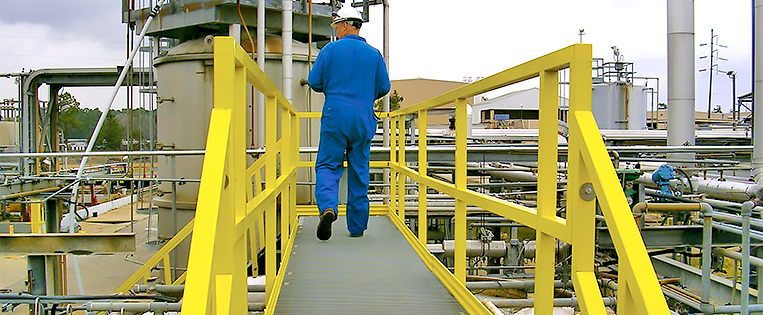How to Choose the Right Corrosion Resistant Material
The problem of corrosion becomes inevitable when the structures are in direct contact with water and other chemicals, e.g., in swimming pools and water parks. It includes frequently accessed places like pool access ladders, stair towers, and handrails. Corrosion poses a significant accidental risk to all these safety-critical components. The chosen material eventually governs the mechanical and chemical properties of the final product. Hence, selecting the right corrosion-resistant material is crucial for building safe, cost-effective, durable structures.
Importance of corrosion-resistant material
Besides degrading material, corrosion negatively impacts the mechanical properties, integrity, and longevity of components, thus adding significant maintenance and repair costs.
The chosen material should fulfill specific criteria, such as minimal dissolution in aggressive solutions and local and enhanced corrosion resistance when subjected to stresses. For structural applications, the corrosion-resistant material should possess high strength, be lightweight, and offer ease of installation. Longevity and economic consequences in case of failure are also crucial to consider. The corrosion-resistant material should also be able to withstand high temperatures.

Key applications
Corrosion-resistant materials find applications in airspace carriers, automotive components, marine industry, structural reinforcements in apartment buildings, electrical systems applications, parking garages, bridge decks, drainage systems, and recreational water facilities.
Benefits of using fiberglass over other materials
Traditional materials for structural applications include various steel grades based on chromium content. Chromium oxidizes to form a protective chromium oxide surface layer. Carbon steel and galvanized steel least resists corrosion. Steels alloys such as austenitic stainless steels and duplex stainless steels are relatively much higher corrosion-resistant alloys.
Other corrosion-resistant materials include copper alloys such as brass and bronze, in which copper oxidizes to form a protective oxide layer. Metals such as titanium and tungsten are susceptible to galvanic corrosion; they exchange ions and corrode locally.
By contrast, fiberglass beats all conventional corrosion-resistant materials. Fiberglass is a composite material based on a polymer resin matrix reinforced by embedded glass fibers. It possesses unparalleled chemical resistivity, especially to corrosion. The interwoven structure of fiberglass makes it inherently impervious to water and other corrosive, alkaline environments.
Fiberglass is extremely lightweight (~80% lighter than steel) with an impressive strength-to-weight ratio and thus enhances the component's performance. Fiberglass can be easily transformed into intricate shapes, thus offering higher manufacturing flexibility.
Using other electrically conductive materials like steel, brass, etc., in swimming pools carries a risk of electrical accidents. Thanks to its electrically non-conductive nature, fiberglass prevents such mishappenings.
Corrosion-resistant material from Strongwell
Strongwell is a world leader in manufacturing cost-effective corrosion-proof materials. Our portfolio of corrosion-resistant materials includes:
- DURASHIELD ® and DURASHIELD HC ®: Fiberglass pultruded panels based on premium polyester or vinyl ester resin, ideal for highly corrosive applications. They feature a synthetic surface veil that improves their corrosion resistance. Typical applications include radar and TV antenna enclosures, wet-end roofs in pulp and paper manufacturing, and chemical pit covers. Durashield HC ® is particularly suited for environments involving high moisture and saltwater.
- SAFPLATE®: It offers a unique combination of pultruded rigid fiberglass plate and an anti-skid grit surface. It is an ideal corrosion-resistant material for building textured solid sheet flooring for pedestrian bridge walkways and trench covers.
- STRONGIRT® Is a fiberglass-based cladding support system s for continuous insulation applications when corrosion resistance and thermal efficiency issues are of concern.
- SAFRAILTM: Cost-effective safety railings for guard rails, stair rails, and walkway handrails in corrosive environments like those in industrial chemical and wastewater treatment plants. They are manufactured in square and rounded configurations.
- DURAGRATE®, DURADEK®, and DURAGRID®: Fiberglass-based gratings for building platforms and machinery housing, especially in safety-critical applications subject to corrosive environments and oil spillages.
- COMPOSOLITE®: Lightweight, corrosion-resistant material for secondary containment systems in chemical storage areas and electric sub-station transformers.
- EXTREN®: Lightweight, pultruded fiberglass structural shapes and plates with excellent corrosion properties ideal for beam and column structures, platforms, grating, and handrails.
Contact our team today to know more about the corrosion-resistant materials we offer.
References:
- https://blog.dahlstromrollform.com/corrosion-resistant-metals
- https://www.fastradius.com/resources/top-5-corrosion-resistant-materials/
- https://www.metaltek.com/blog/material-applications-corrosion-resistance/
- https://tantaline.com/DOCs/Technical-Publications/tantaline_technical_publications_corrosion_sensitive_equipment.pdf